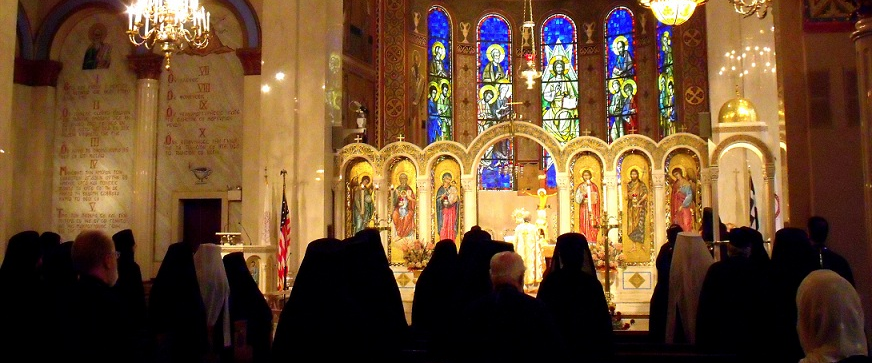
by Fr. Patrick Henry Reardon
Our English word “time” bears a double burden, which in more sensible languages (like Italian) is carried by two different nouns. Thus, our “time” can mean a point in time: an instance or event (Italian volta). Our English “time” can also mean something fluid: a passage of time, or time in sequence (Italian tempo).
In biblical Greek (another sensible language), time as an instance or event is designated as a kairos (in Hebrew mo’ed). “Time” in this sense is a happening, a thing indivisible. When, however, Greek wants to say “time” in the sense of fluidity or a sequence, the proper word is chronos. This obvious root of our English “chronology” indicates time as something measurable, and therefore divisible. Both these Greek words for “time” are important in Holy Scripture.
With respect to the Lord’s Resurrection, of course, kairos is the sort of time that comes first to mind, because this was certainly an indivisible event. If, however, we were to think of the Lord’s Resurrection solely as an individual happening, we would run the risk of separating it from biblical chronology. We might de-historicize it.
In fact, a certain disposition to neglect chronology remains a persistent temptation for some Christians. In the 2nd century, for example, there was Marcion, who radically separated the kairos of Christ from the narrative chronos of the Old Testament. Another example—in the 20th century—was Rudolph Bultmann, who divorced the kairos of the act of faith from the chronos of the historical Jesus.
In view of this persistent heretical disposition, it is significant that our Lord, promptly after the singular event of the Resurrection, made certain that that kairos was not separated from the chronos of biblical history. He singled out two disciples and walked along with them, explaining the relationship of that event to the burden of biblical prophecy: “And beginning at Moses and all the Prophets, he expounded to them in all the Scriptures the things concerning himself.”
That is to say, the salvific events of the Christian faith could not be theologically divorced from the full sequence of biblical history. Revelation is revelatory history.
It may be said, moreover, that the conversation of the risen Christ, as he walked with Cleopas and his unnamed companion, opening the Bible for them, was the Church’s first formal course in theology, This term, correctly understood, is the study of God’s Word: Theou-Logos.
That discourse took place within hours of the Lord’s rising from the dead; on that day
“the Lion of the tribe of Judah, the root of David,” demonstrated that he “was worthy to take the scroll and to open its seals.” He was worthy to do this because he was slain and had redeemed us to God by His blood (Revelation 5:5, 9).
Jesus interpreted Holy Scripture, because he “fulfilled” it through the historical and theological events of His death and Resurrection. His blood-redemption of the world was the foundational principle of theology.
From time to time, as we know, Jesus had interpreted individual passages of Moses, Isaiah, David, and other Old Testament writers, normally in reference to himself. In that discourse on the road to Emmaus, however, our Lord devoted the entire effort and time to this single theme, laying the foundation for the proper Christian understanding of the Bible.
It may be said that all orthodox Christian exegesis goes back to that conversation, and we correctly approach the writers of the New Testament as illustrating the interpretive patterns put forward in that conversation. The “allegory” (Galatians 4:21-31) or “spiritual sense” (1 Corinthians 2:6-16; 2 Corinthians 3:18) of God’s Word is that Word’s underlying Christological reference, its relationship to the risen Lord, who brings it to historical and theological fulfillment.
Clothed in the literary forms of history, parable, and poetry, the Bible’s deeper doctrinal message is ever its reference to the Mystery of Christ, who is at once God’s only path to us and our only path to God.
Thus, every line of the Bible, every symbol and every story, every prophecy, proverb, and prayer bears its deeper and proper significance in Christ. Its meaning is conveyed in the teaching and sacraments of the Church.
